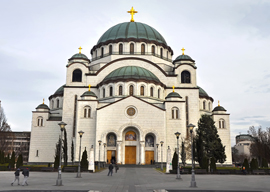
December 04, 2017

Church of Saint Sava, Belgrade
Source: Bigstock
Yet something special lives on in Belgrade. Like bark on a tree, the dead hand of Communism, then isolationism, has preserved the sap of a living culture. The historical kafanas are staffed by distinguished waiters in the same gray smocks worn since the days of state ownership. They will take your cigar and return it perfectly lit. An accordion band lovingly reproduces the songs of the prewar city. Bar fights are rare, as there is always another toast to make. With shorter supply chains and less regulation, foodstuff is infinitely better than inside the E.U. Grand portions of flame-grilled meat are prepared with great culinary self-assurance (“The French?” said one girl pityingly. “They cannot prepare their meat properly”). In summer, wafer-thin teens in bikinis devour half-pound burgers—claimed as a local invention—as silently and single-mindedly as paper shredders.
Underpinning it all is rakija. A high shot glass of this stuff is the jewel around which Balkan culture revolves. It is party rocket fuel, imparting a rising clarity. No self-respecting Serb buys from a shop, instead powering the family still with plums from the family orchard. This means it is both everywhere and nowhere.
Without rakija, I would not have woken up in a doorway one morning, cradling a month-old puppy. The doorway wasn’t a worry: Belgrade is probably the safest city in Europe. But the only person I knew who owned a puppy was the last person from whom I’d want to steal it. An hour later, he swept up to my flat in a long German saloon and wordlessly retrieved the dog. I sent around a magnum of excellent Bulgarian wine and a dog toy, accompanied by an extremely contrite note. The following week a lunch invitation arrived. I climbed the steps in the calm but surreal knowledge that lunch could consist of a bullet. The door swept open to reveal roast chickens, a platter of Macedonian tomatoes sprinkled with sea salt, and my magnum quietly airing. “I love you. I love you!” said my host. I left well after dark. What in any other country would have made me an enemy had made me a friend for life. “I’m a Serb,” one correspondent was told during the First World War. “So I am a peasant and a king!” Here in the West, we are neither.